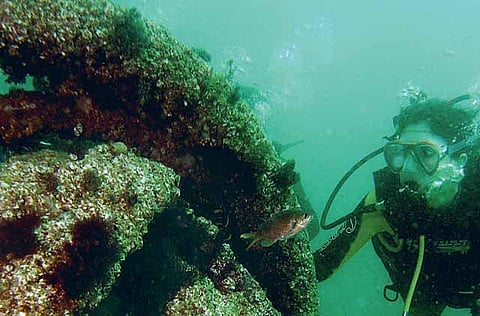Soft dreams on the seabed
Man-made reef balls dropped off the coast of Le Meridien Al Aqah Beach Resort have transformed the marine landscape and make for a great diving experience

Protecting the aquatic ecosystem of the Arabian Gulf is a growing concern not only for environmentalists but also for some in the hospitality business. On the country's east coast in Fujairah, a project launched eight months ago to deploy artificial structures to rehabilitate coral reefs is already attracting marine life.
Last June, 14 man-made reef balls — dome-shaped concrete structures with holes on top and the sides — were moved by crane to the water and airdropped about 100 metres off the coast of Le Méridien Al Aqah Beach Resort.
In the beginning
The project came about after Cyclone Gonu hit the emirate in June 2007 and transformed the landscape of the coastline, said Patrick Antaki, the resort's general manager.
"The beach was reshaped by the force of the hurricane and parts of the reef were damaged. We talked to marine biologists and dive organisations who suggested the artificial reef project," Antaki said.
Coral destruction also occurred last year during the red tide and by ships filled with ballast tanks that refuel off the coast.
"At that point, we thought it would be a nice idea to try the reef-ball project," said Simon Tambling, managing partner, Al Boom Diving, which oversees the project. "We wanted to give something back to the environment because we take so much from it."
An additional 20 reef balls have been placed since, some weighing more than two tonnes. They are covered in barnacles and what is believed to be the beginnings of soft coral. They are made of a low pH concrete and gravel mix, which does not change the water's acidity. They take five years to mature to soft corals, before changing into hard corals over time.
The extensive project, which is supported by corporate sponsors and the local government, was recently inspected by a group of divers from Al Boom Diving and volunteers from the resort.
"The effects are already visible and we are laying the foundation to sustain marine life for future generations. The artificial reef is already a viable fish reef. All of the needed plankton and plant life is growing on the reef and in time we hope to see signs of corals," Antaki said.
On a good day, divers can see plenty of fish, including hammour, bannerfish, Sergeant Majors and jacks, besides eels and crabs.
Al Boom Diving is working in collaboration with the Dubai Aquarium, which sponsors 100 more reef structures, according to Tambling.
More than Dh100,000 has been spent for the project so far, on importing reef block structure moulds, fabrication, deployment with cranes and parachutes and man hours.
The artificial reefs are designed in the US by the Reef Ball Foundation, which aims to rehabilitate the world's ocean reef ecosystems and protect the natural reef systems. Biologically, the reef balls have been shaped to optimise protective void spaces for fish and include features such as rough surface textures to enhance coral settlement. Holes designed to create whirlpools help provide nutrients to animals and plants living on the reef ball's surface.
Hatching ideas
The structures are made from an easy-to-use portable fibreglass mould system. The local cement construction company Lootah Group has been pouring the cement into specially-shaped moulds and "hatching the reef balls", as the process is called.
Under Al Boom's project, the structures have been placed several hundred metres away from the private beach at Le Méridien Al Aqah to create a house reef.
"Diving is a great recreational activity but it must go further to foster understanding of the importance of protecting the delicate marine environment," Tambling said.
Fujairah is a diving destination and although this project will not change the map of tourism in Fujairah, it will certainly highlight the area as a good diving experience, Antaki said.
Le Méridien Al Aqah is involved in other environmental-friendly initiatives. The resort created a permanent green team whose goal is to reach ISO accreditation. "We try to keep our carbon footprint low," Antaki said.
To do so, the resort team use solar energy when they revamp the beach. They also changed the pool's heating/cooling system to heat exchangers that use excess heating/cooling power.
The reef ball is now rolling as other similar projects are in the works at hotels in Jebel Ali and Abu Dhabi, according to Tambling.



